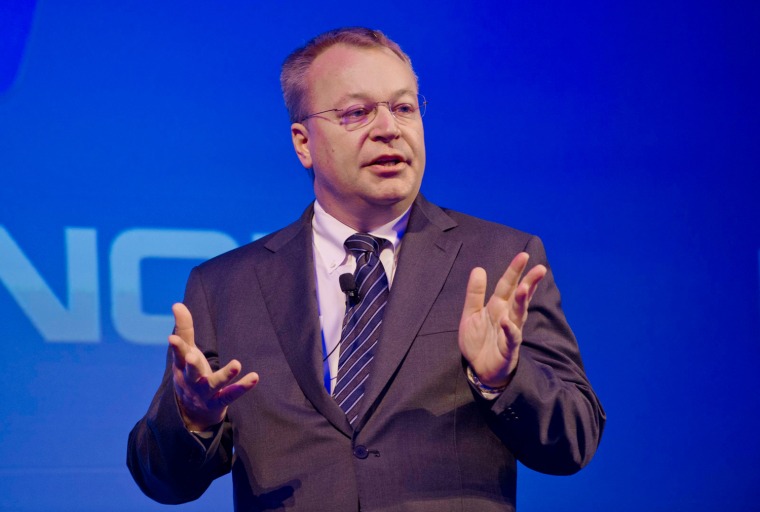The man who could be Microsoft’s next CEO doesn’t shy away from a challenge.
When Stephen Elop was a college student in the 1980s in Hamilton, Ontario, he was frustrated by the limited data-sharing methods available at the time. So he decided to lay Ethernet cable around the campus to create one of the first Internet networks in Canada.
"While others were sharing data by downloading it to tape or disc, he was running 22 miles of cable from building to building to automate the process," Michelle Donovan, public relations manager for McMaster University, Elop's alma mater, said.
Now, Elop, who is stepping down as Nokia’s CEO to run Microsoft's devices group as a result of the tech giant’s $7.2 billion purchase of the Finland-based company’s cellphone service, will grapple with a new kind of task: proving that he deserves front-runner status to replace Steve Ballmer, Microsoft’s current CEO, who will step down in the next 12 months.
To earn that spot, he’ll have to re-acclimate to the Microsoft culture (he formerly ran its Business Division, which includes Office) and prove that he can play ball with the current crop of Tech Titans bringing buzz to the industry: Yahoo’s Marissa Mayer, Facebook's Mark Zuckerberg, and Google's Sergey Brin.
Who is Stephen Elop?
He’s a husband and father. Elop has five kids: triplet girls, one adopted daughter from China and a son. The Canadian-born 49-year-old is an avid hockey fan and a licensed pilot. He and his wife have donated hundreds of thousands of dollars to the university, where they met.
And he’s a had a varied career. After graduating in 1986 from a five-year bachelor's program in engineering and management, Elop worked at Soma Inc., a Canadian software development and management consulting firm. Soma was acquired by Lotus Development Corp., and he became director of the firm's consulting services group, overseeing Canada and the midwestern U.S.
By the early 1990s, Elop decided to expand into the food industry. He was chief information officer of Boston Chicken and Einstein Brothers Bagels until Boston Chicken, which later became Boston Market, filed Chapter 11; then, in 1998, he became CEO of Macromedia, a San Francisco-based graphics software company. He was there for seven years and had one-year stints at Adobe and Juniper Networks, a networking equipment manufacturer, before his first Microsoft stint.
Mixed history
While industry experts believe it's highly likely that Elop will succeed Ballmer, he doesn’t have it locked up.
"[Ballmer is] securing the opportunity to get Elop as CEO, but the decision is not just up to Steve Ballmer. The decision is up to Bill Gates and the rest of the board," said Jeff Kagan, a technology industry analyst. "Do they find someone from inside Microsoft or do they find someone from outside of Microsoft? And would they consider Stephen Elop someone from the inside or the outside? Because he's got both inside of him.
"He has the ability to run Nokia, but does he have the ability to run a massive, multi-times-the-size-of-Nokia company, in many different areas, not just mobile, like Microsoft?" he added.
Elop plans to officially rejoin Microsoft after the Nokia deal is closed, which is expected to happen in the first quarter of 2014. Ballmer announced on Aug. 23 that he would be retiring within a year.
While the work Elop did at Nokia may have gotten the company acquired, it didn't necessarily do much for his reputation, especially his signature move as Nokia CEO: In 2011, he nixed Nokia's homemade Symbian software, already installed on millions of phones, and chose the unproven Windows Phone 7 platform over the far more popular Android mobile OS.
"Pre-Nokia, he had developed his reputation on the work he had done on servers and software, and that's what attracted Nokia to have him as CEO," said Chetan Sharma, a wireless industry consultant. "Post-Nokia, you find people in two camps: Either they hated the decision that he made to go with Windows and he pretty much destroyed most of the value that Nokia had. The other camp was that Nokia was already going down [in value], and there was no option. He made a bold move and it just didn't work out."
But internally, the biggest blemish on Elop's record came in February 2011, when he sent a memo to all Nokia staff. The note was dubbed "Burning Platform" because it described in harsh terms how he saw Nokia's business at the time: like an oil rig that was ablaze, with workers being forced to jump into the North Sea.
Needless to say, he wasn't embraced in Finland afterward.
Work to do
But his past missteps don't necessarily mean if he is given the chance to follow in Ballmer's footsteps, he won't be able to compete with other big names in the tech field.
"The others have more charisma and are better liked by the tech crowd and the press, versus Elop, whose prominence only came after the Nokia job," Sharma said. "He has to earn it. He has to show that he has turned around the ship in terms of adoption [after the Windows Phone move]."
Kagan agreed that Elop "doesn't compare — yet."
Whoever the new Microsoft CEO ends up being, Kagan said, "They need somebody who is good at looking backwards and good at looking forwards. That's the mistake that Blackberry made. [CEO Thorsten Heins] only looked forward for new customers. With Microsoft, they have to have someone with experience and maturity, and Elop could be that person."
Kagan said Elop's experience is good, but "the question is whether it's the right combination to unlock Microsoft's potential."
Related content:
